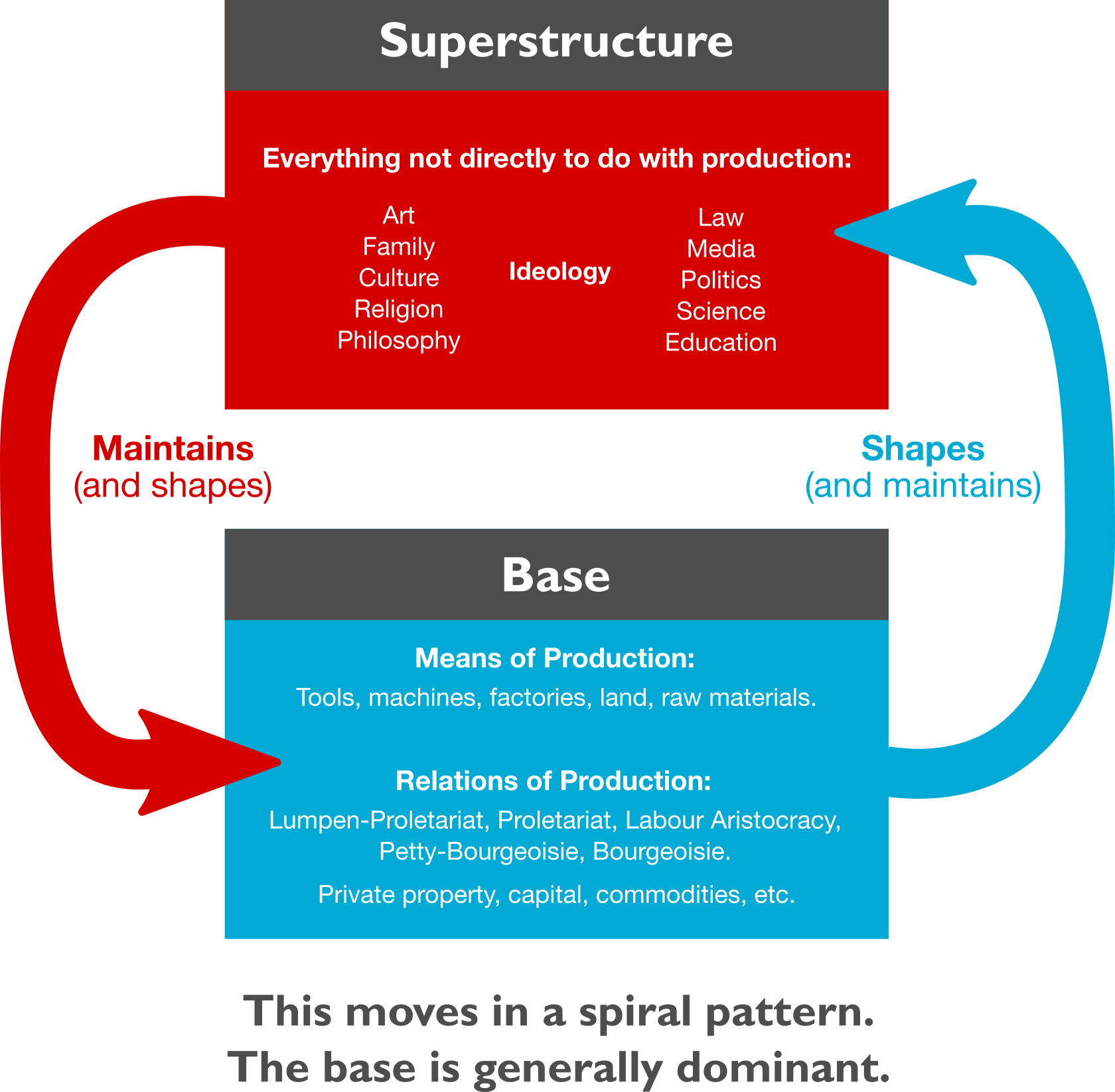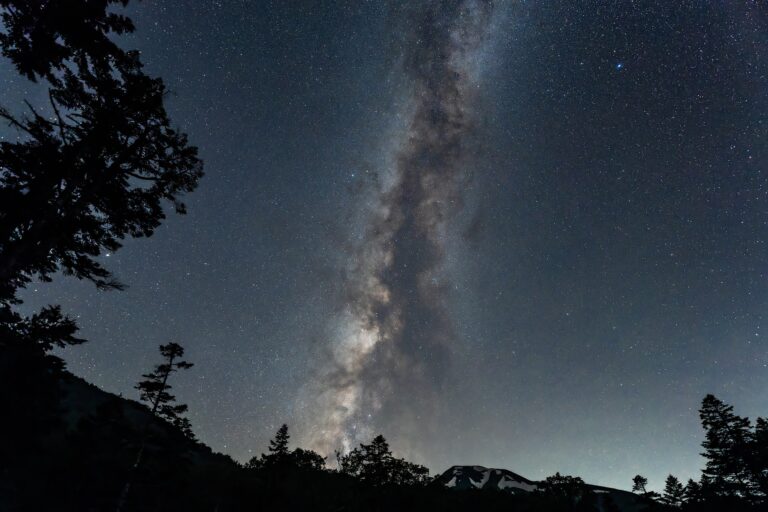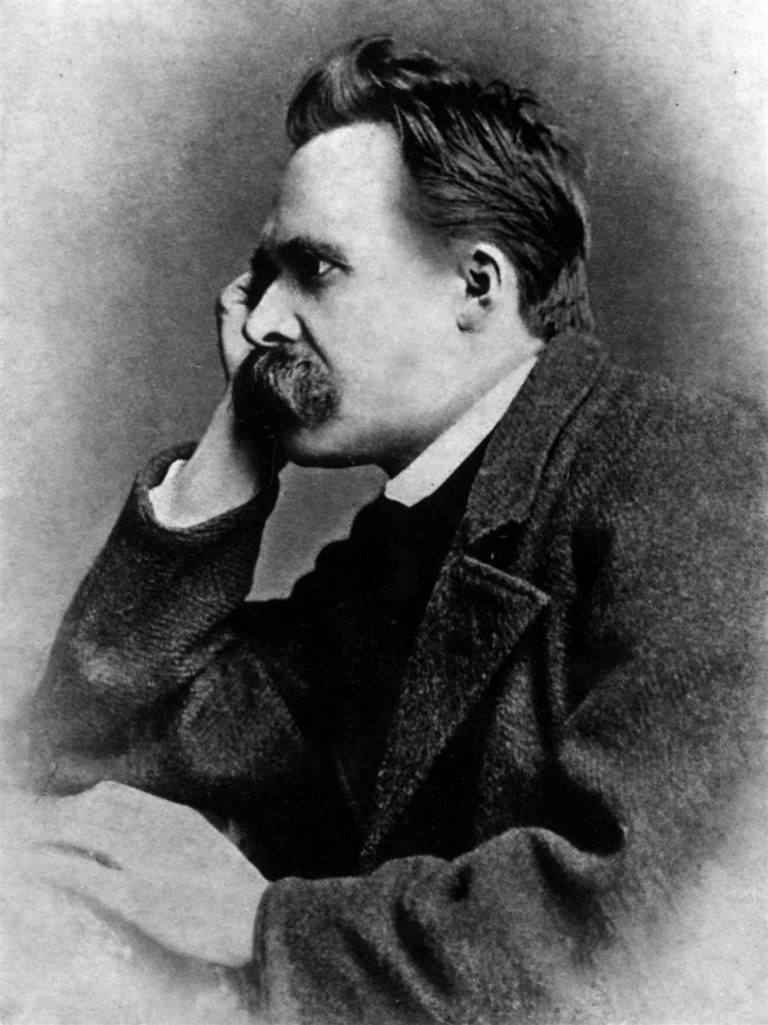
The following quote is the famous passage that seeded the famous base and superstructure model in Marxian theory.
“The sum total of these relations of production constitutes the economic structure of society, the real basis on which rises a legal and political superstructure and to which correspond definite form of social consciousness.” Preface of A Contribution to the Critique of Political Economy 1
From this, society is divided into its economic base and the ideological superstructure resting on top of it. But why is this model important? Because it demands that we set our priorities right and come to know that culture, ethics, theology, politics etc. do not exist independently of the material world but are conditioned phenomena arising from it by living human beings engaged in economic production and reproduction. In a nutshell, our model anchors the realm of ideas to the material world, without which it cannot subsist. This being a fundamentally a materialist view, unsurprising as Marxism is a materialist philosophy.
ECONOMIC BASE
“mankind must first of all eat, drink, have shelter and clothing, and therefore work before it can pursue politics, science, art, religion.” – Frederick Engels’ Speech at the Grave of Karl Marx 2
Engels points out a simple observation to us, but a profound one which firstly highlights the material, physiological needs that are inherent in all biological organisms. Since human beings first appeared on this planet, they spent their time preoccupied with laboring for a sustainable source of food and water which had to provide them with more energy than they expended. So yes, physiological priorities always are a vital prerequisite which must be met first before pursuing the lofty ideals of justice, politics, religion and the supernatural.
“Grain was stored in sizeable building which, standing out from the surrounding land, came to symbolise the continuity and preservation of social life.”3
Marxists pay attention to the material, sensuous world of real economic activity carried out before our very eyes. Every person’s wellbeing is tethered to the state of the economy, how well its performance is and access to goods and services.
All societal forces responsible for the production and reproduction of human society finds its sphere of activity within the economic base—‘the real basis’. The material productive forces of society supply it with the necessaries of life and its amenities. Its movements expresses itself in the world through production, distribution, exchange and consumption. And what makes up the material productive forces? They are made up of the means of production— being productive components such as factories, machinery, tools, land, raw materials—and living human beings performing work: labour. Labour wrests the raw materials from nature’s bosom by its transformative powers, once dead inert matter have now become objects of utility (use value).
For anybody to engage in labour there must be the specific means of production to do so, the peasant without his plough cannot engage in agricultural labour and the modern worker employed as a welder cannot be competent without the necessary range of tools needed for that job. And that croissant we enjoyed earlier in the cafe was not dropped from the sky by a benevolent supernatural entity, but through a specific concrete labour process that’s necessarily found in a bakery.
Marxism highlights the physical dependency of humanity on the material world. For human beings to continue working, talking, debating, protesting, philosophising and ultimately, carrying on their corporeal existence. They must engage in material production independent of their will and this means that the economic base must be ever present to ensure history and ultimately human existence reproduces itself from now and into the future.
SUPERSTRUCTURE
With the satisfaction of societies’ material needs the role of the superstructure is able to act without disruption. But what is the superstructure? The superstructure represents all those non-economic institutions which includes law, ideology, religion, art, culture, education, media and the family—all those institutions marked by having no role in production relations.
As the superstructure arises out of the economic foundations, it’s able to intervene on the economic base should problems arise, such as the drafting of trade laws, controlling imports/exports, regulation of taxes and the Factory Acts rolled out by Parliament of the United Kingdom during the 1800s.
Lawyers, doctors, teachers, artists, news readers and priests have their roles in the service sector and intellectual production, but are not productive labour—in Adam Smith’s sense—because it’s labour that does not generate material wealth like that from a factory’s assembly line.
The police, the law, the courts systems and the army represent the repressive elements of the state superstructure, they are responsible for not just physically preserving law and order and fighting abroad, but are also involved in upholding property rights which also includes preserving the privileges of the ruling class in maintaining control of the economic base.
The tools of the superstructure are put into motion in other ways too, like defending the ideological status quo through normalising the dominant relations of production and the class rule of those in power as something given. And what is an example of how this can be done? During the Middle Ages, imagine a peasant tilling his field, he pauses work to wipe the sweat from his brow and during his little break, he’s afforded some time to contemplate the way of the world of things. What was it he thought about? He thought that there will always be land ruled over by lords, the best fighters will always be knights, guidance and the purpose to life will always be spelled out by literate priests and that earthly rule will always be divinely ordained by God (Divine right of kings). That there, is an example of man’s social existence within the feudal superstructure determining his consciousness. You could say that the superstructure has a conservative element to it!
Dialectical not deterministic
“According to the materialist conception of history, the ultimately determining element in history is the production and reproduction of real life. More than that neither Marx nor I have ever asserted. Hence if somebody twists this into saying that the economic element is the only determining one, he transforms that proposition into a meaningless abstract senseless phrase.”4
With all that has been said so far, this is not to say that the economic base directly determines absolutely all social phenomena or the contents of ideas, but it can have a strong influence on the psychology of the people within the society. Although different, the base and the superstructure are not in strict separation, but they influence each other in a bounded dialectical relationship. To say that the economic base determines the content and character of ideas isn’t entirely accurate. They both expand and evolve in different ways, the economic base can give rise to new production technologies and economic classes, while the superstructure can give rise to new classes not related to production.
Characteristics of the superstructure can change without the any drastic changes to the economic base. Let’s give an example of this from the ancient world. When Christianity entered the world stage, it did so within the theatre of the Roman Empire. It eventually gained increasing social influence despite repressions by the Romans. For its time, Rome was an empire with a strong economic base and around the first century AD had millions of slaves.
“Scholars estimate about 10% (but possibly up to 20%) of the Roman empire’s population were enslaved. This would mean, for an estimated Roman Empire population of 50 million (in the first century AD) between five and ten million were enslaved.”5
Christianity would’ve never arisen as the world-historical religious force that it was without the womb of the Roman Empire. For the economic base was already provided by the Roman Empire, all Christianity had to ensure was to win superstructural supremacy to become the institutionalized, dominant metanarrative as it inherited the vast tracts of land and all the humanity that stood on it. It kicked out the old pagan religions, but the mode of production was left unscathed.
Christianity existed through multiple modes of production from when the mass producers were still slaves, through serfs in feudalism and to the modern day working class under capitalism. Still floating around today within the superstructure of society sharing a pool with other ideologies, be they religions, philosophical or political.
I thought about how it’s not just the act of production in itself that’s important, but also the need of getting that material wealth to where in the society it is needed. We can think of the transportation of goods and services within any economic formation—whether by dirt road, highway or railway e.g.—as the economic equivalent to the blood vessels of the circulatory system coursing through the human body. Destroy that infrastructure and you disrupt the supply chains to distributive trades—supermarkets, nightclubs, restaurants, hardware and furniture stores—and you tell me it won’t have a corresponding impact in the very mode of human life!
“Men make their own history, but they do not make it as they please; they do not make it under self-selected circumstances, but under circumstances existing already, given and transmitted from the past. The tradition of all dead generations weighs like a nightmare on the brains of the living.”6
Citations
1: https://www.marxists.org/archive/marx/works/1859/critique-pol-economy/preface.htm
2: https://www.marxists.org/archive/marx/works/1883/death/burial.htm
3: A People’s History of the World, Chris Harman
4: https://www.marxists.org/archive/harman/1986/xx/base-super.html
5: https://www.britishmuseum.org/exhibitions/nero-man-behind-myth/slavery-ancient-rome
6: https://www.marxists.org/archive/marx/works/1852/18th-brumaire/ch01.htm

